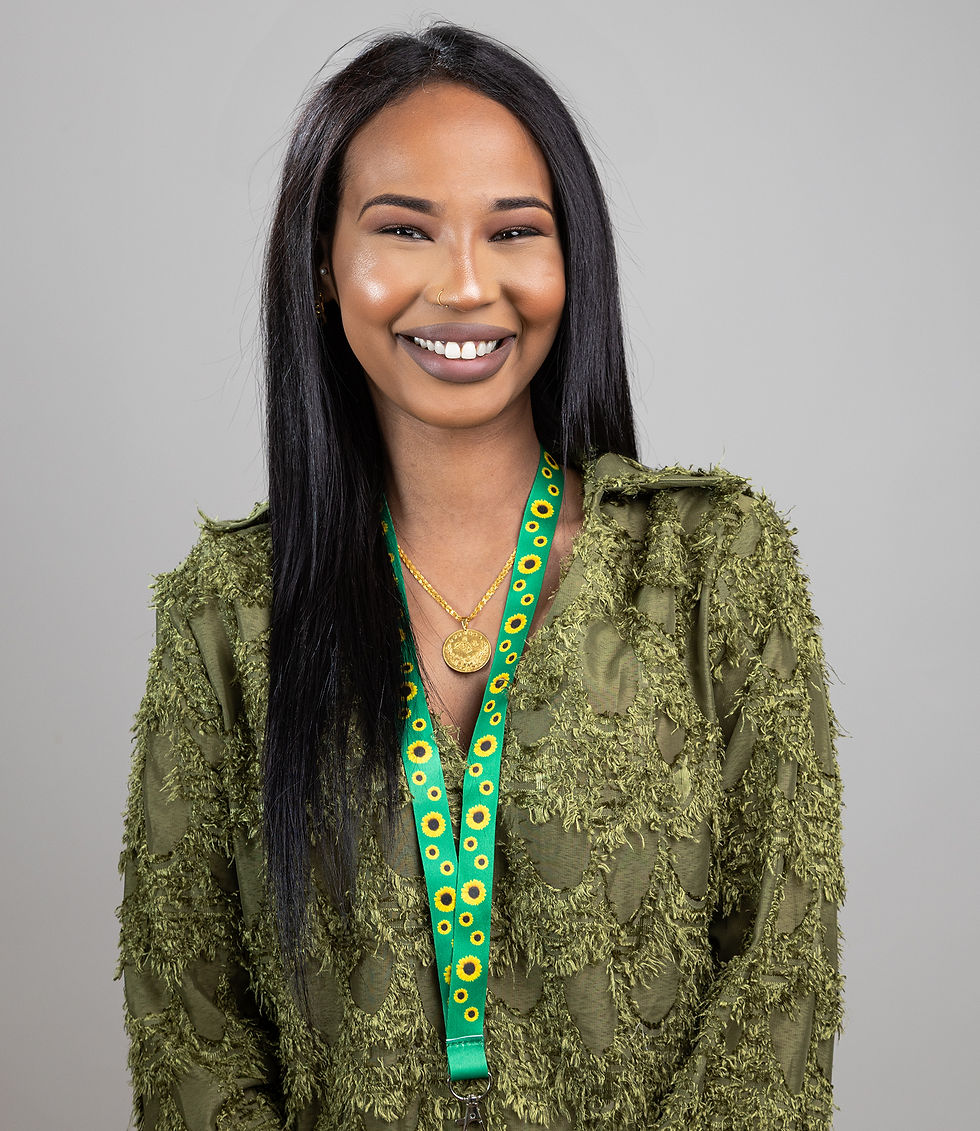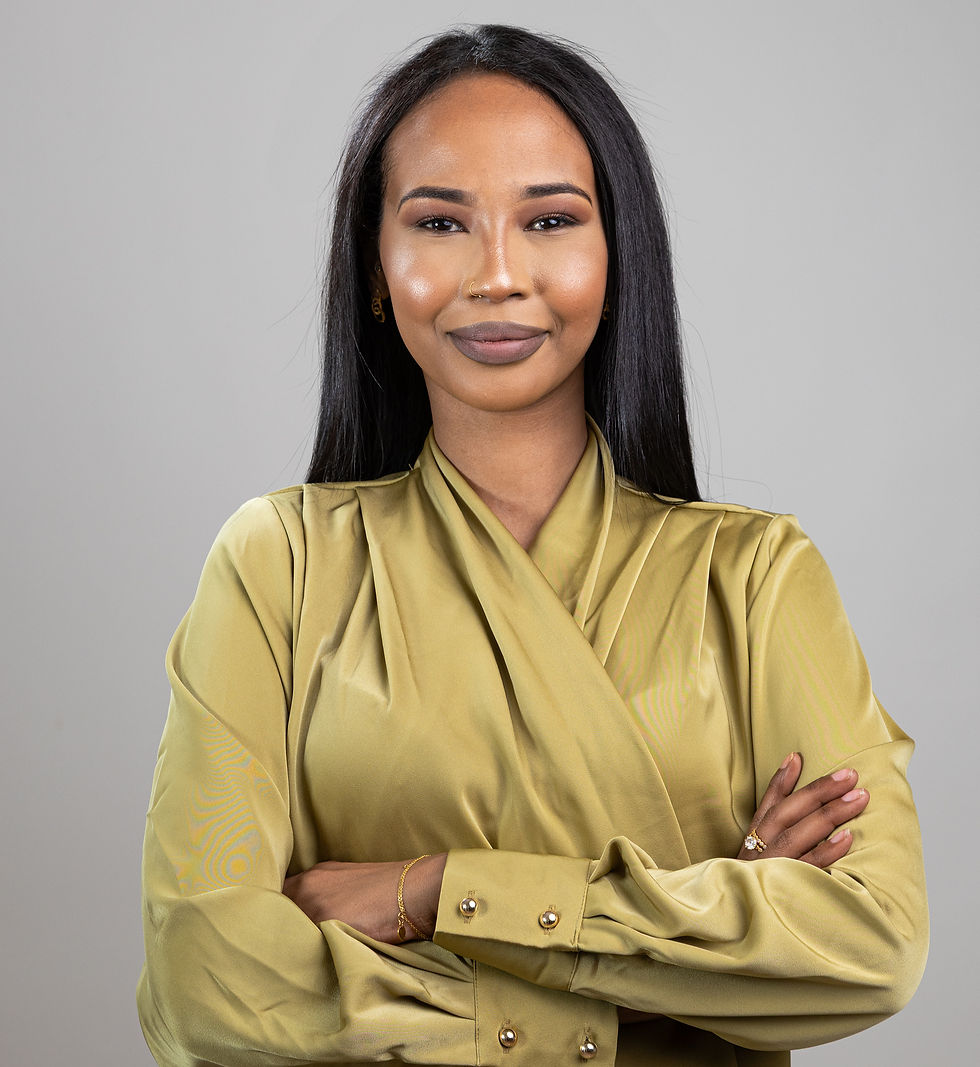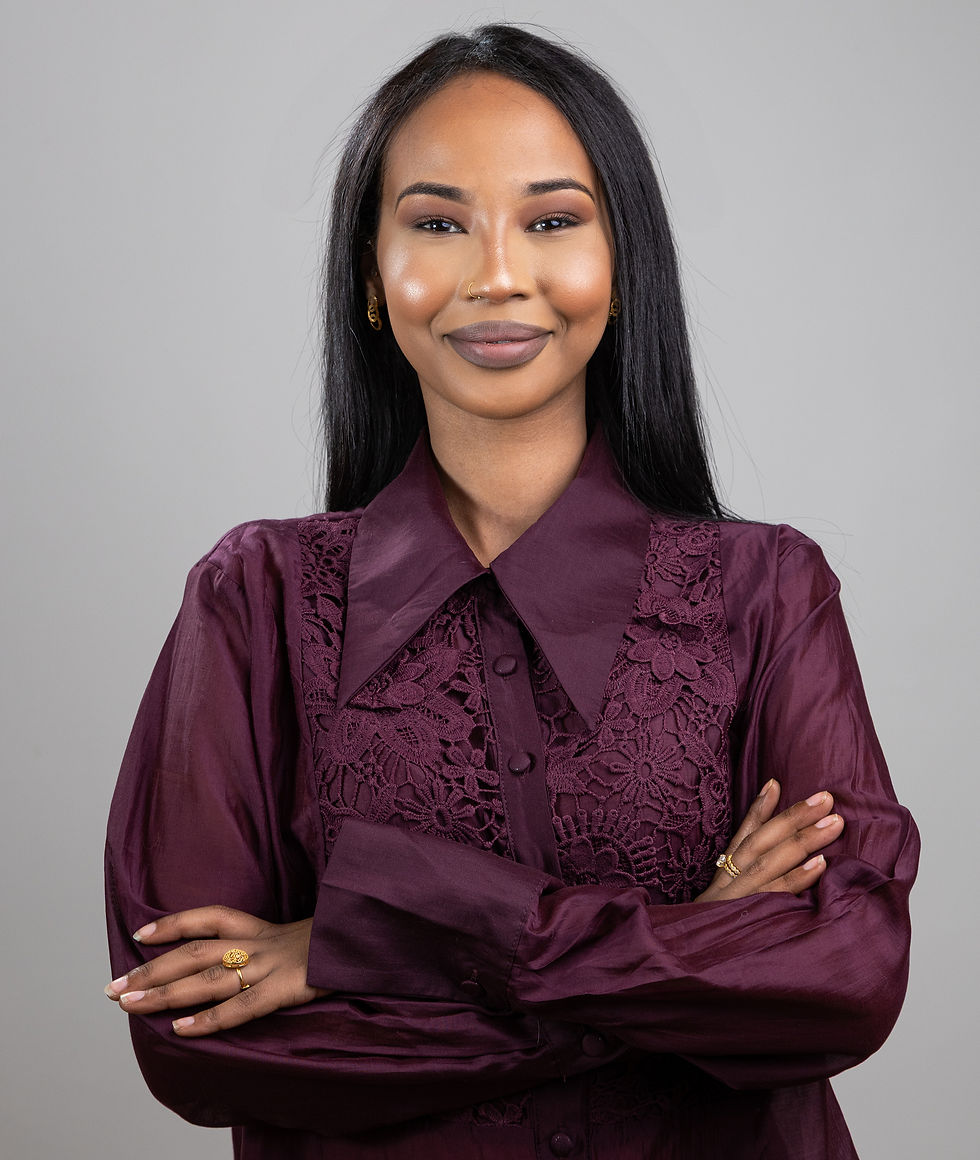Leadership rooted in empathy and inclusion.
- The International
- Aug 7, 2025
- 7 min read
Updated: Aug 8, 2025

Kifaax Malin didn’t set out to enter politics - she set out to make people feel seen. Shaped by her Somali heritage, Danish upbringing, and lived experience with ADHD, she’s turning personal challenges into public change.
Photographs: Alex Flutur
Text: Lyndsay Jensen
Kifaax Malin’s life has always been a balancing act between cultures. Raised in Denmark, she feels most at home within Danish society, yet her Somali roots remain a strong and steady current in her life. Rather than choosing between these worlds, Kifaax has found a way to embody both. Her identity is not fragmented - it’s whole, shaped by family traditions, cultural curiosity, and a deep appreciation for diversity. Her love for food and music, for example, reflects this blend. From cooking traditional Somali sambusa with her family to immersing herself in global and Danish music, Kifaax finds joy in cultural exchange. This openness has made her not only more curious but also more empathetic, especially in diverse social settings.
Navigating different cultural expectations has never caused Kifaax serious conflict, but there have been moments where societal norms and family values did not fully align. In such cases, she’s learned to navigate her own path - one that honours both her heritage and her present. Through her work on international youth projects, she’s seen firsthand how cultural exchange is a beautiful thing. Helping young people from different countries find internships in Aalborg, she’s watched collaboration build stronger, more engaging communities. To Kifaax, this work proves time and time again the importance of inclusion and kindness, especially toward those who choose Denmark as their new home.
Her personal and professional values were strongly shaped by her mother, who saw education as a critical opportunity. Having missed out on higher education herself, her mother supported her in pursuing university and made the most of every opportunity. That support became a source of motivation, one that shaped her drive to succeed and her belief in using success as a way to uplift others. Today, her approach to leadership is defined by empathy, listening, and curiosity. She leads by connecting, understanding, and valuing diverse perspectives.
A multicultural voice for inclusion
Working on international projects has also sharpened her ability to thrive in multicultural environments. Kifaax has developed a nuanced understanding of how to collaborate across cultural lines. Diversity, in her eyes, is not just a value but an operational strength - it helps teams think broadly and act with creativity. She has found that her ability to respect and understand different cultural contexts has been essential in building trust and developing meaningful partnerships.
Despite progress in many industries, Kifaax believes diversity and inclusion initiatives often fall short of making real change. Symbolic efforts are not enough, she argues. What’s needed is meaningful action in recruitment, leadership, and decision-making spaces where diverse voices can shape outcomes. Without that, inclusion remains a surface-level goal rather than a systemic reality.
Language is another space where Kifaax’s multiculturalism shines. She is fluent in Danish (her native language), speaks some Somali, and uses English daily at work. These languages have opened doors for her both socially and professionally, allowing her to connect with a wide range of people and perspectives. She has also noticed distinct communication styles - Somali conversations tend to be more direct and expressive, while Danish communication is often reserved and indirect. Kifaax has learned to navigate both styles with grace, adapting her approach based on context and, above all, listening first.
One of the things people often find surprising about her heritage is food-related, specifically sambusa. Many assume it’s an Indian dish, but she enjoys introducing them to the Somali version, which has its own unique flavour and preparation. These small moments highlight how easy it is to make assumptions about culture, and how rewarding it can be to challenge them.
"I’ve never had to choose between being Somali or Danish - my identity is not fragmented, it’s whole. It’s shaped by family traditions, cultural curiosity, and a deep appreciation for diversity, which guide how I live, connect with others, and find joy in the richness of different cultures."

From personal struggles to public advocacy
Over the years, Kifaax has watched a shift take place in Denmark. More young people with multicultural backgrounds are becoming visible in public life, stepping into leadership roles, and reshaping narratives. These role models are creating new patterns, and she is proud to be part of this movement. Her contribution goes beyond cultural identity - she’s also an advocate for mental health and neurodivergence, shaped by her own experiences living with ADHD and anxiety.
It was these challenges that pushed her toward politics. Kifaax knows first-hand how difficult it can be to access support and feel understood. She also knows the system often fails people like her, especially women and girls who are diagnosed too late or misdiagnosed altogether. These delays are particularly harmful to youth and young adults, whose education and employment prospects can be profoundly affected by late or inadequate support.
Kifaax is determined to change that. She believes that awareness is not enough; policy change must follow. Her advocacy centers on reducing wait times, increasing resources for youth mental health, and streamlining access to therapy, without endless referrals or bureaucratic barriers. She also wants to challenge harmful stigmas, especially those suggesting that ADHD or anxiety are simply a matter of personal discipline. Such misconceptions are not only wrong but damaging, and Kifaax is committed to normalising neurodivergence. Her message is clear: people can succeed and thrive while being different.
"Inclusion isn’t symbolic - it’s essential. Change happens when diverse voices shape decisions, not just sit at the table."

A political platform of representation
Running for office is her way of turning personal experience into public service. Her platform is built on authentic representation - not just for neurodivergent individuals, but also for people from mixed cultural backgrounds and marginalised communities. She believes representation means more than visibility; it means lifting others and making space for their voices. Her campaign is grounded in listening, openness, and an unwavering commitment to inclusion.
Kifaax argues that neurodivergent voices are essential in political spaces. People who think differently offer new ways of solving problems and seeing the world. Excluding them means designing systems for a narrow group, leaving many behind. Inclusion, she believes, is fundamental to democracy - not a bonus, but a necessity.
Since announcing her candidacy, she’s been moved by the responses, especially from young people who feel seen and validated. Many have thanked her for being open about her mental health challenges, telling her that her vulnerability makes them feel less alone. While sharing her personal story publicly has been difficult at times, Kifaax believes it’s worth it.
She plans to engage young people directly - visiting schools, community centres, and youth organisations. She’ll use social media as a tool for dialogue and advocacy, providing practical ways for young people to get involved. Most importantly, she wants to create political spaces where youth voices are not just heard but taken seriously.
A new kind of leadership
Kifaax Malin represents a new kind of leadership - one defined by empathy, cultural awareness, and lived experience. Her work in mental-health advocacy, her dedication to inclusion, and her commitment to representation are all part of a larger vision: a society that sees difference not as a challenge but as a strength. Through her political work, she speaks for a generation that refuses to be left out of the conversation.

Denmark’s mental-health crisis: Neurodivergent youth face long waits and limited support. Across Denmark, a growing number of young people are struggling to access timely mental health care, especially those who are neurodivergent. Conditions such as ADHD, anxiety, and autism are increasingly recognised, yet the healthcare system is struggling to keep pace with demand.
Alarming wait times
Current wait times for specialist care are exceptionally long. On average, young people referred for neurodevelopmental evaluations face a wait of up to 92 weeks - nearly two years - before seeing a specialist. Even general mental-health services are overloaded, with waitlists ranging from 16 to 20 weeks, and in some municipalities, the wait for an initial consultation can stretch to 10 to 18 months.
Impact on education and daily life
These delays have real consequences. For youth and young adults, late diagnosis and limited support can disrupt school, work, and personal development. Many young people report feeling isolated or misunderstood, especially when their symptoms are dismissed as behavioural problems or poor self-discipline.
Gender disparities in diagnosis
Girls and women are particularly vulnerable to being misdiagnosed or diagnosed late. Traditional diagnostic models often reflect male presentations of conditions like ADHD, meaning many young women fall through the cracks or receive inaccurate assessments.
Stigma and misconceptions
Despite increased awareness, stigma around neurodivergence persists. ADHD is often trivialised or viewed as a lack of effort rather than a neurological condition. Such misconceptions not only delay treatment but also discourage young people from seeking help.
The call for reform
Experts and advocates across Denmark are calling for systemic change. Key priorities include shorter wait times, increased funding for youth mental health services, and better training for educators and healthcare providers. Streamlining access to care by reducing bureaucratic barriers and excessive referrals is seen as essential to improving outcomes.
Beyond healthcare, there is a broader societal need for inclusion. Schools, workplaces, and communities must adapt to support neurodivergent individuals, recognising that diverse ways of thinking are not a problem to be fixed but a strength to be supported.
As mental health challenges rise among Denmark’s youth, the pressure is on to modernise the system and ensure that no young person is left behind.
Mental health resources and support in Denmark:
Headspace Denmark
Free and anonymous mental-health support for young people.
Website: www.headspace.dk | Phone: 70 20 53 63
Landsforeningen Autisme (National Autism Association)
Resources and support for individuals with autism and related diagnoses.
Website: www.autismeforening.dk
ADHD-foreningen (ADHD Association Denmark)
Support and information for individuals with ADHD and their families.
Website: www.adhd.dk
Psykiatrifonden (The Mental Health Foundation)
Information, helplines, and mental-health resources.
Website: www.psykiatrifonden.dk | Phone: 39 25 25 25
If you or someone you know is struggling, don’t hesitate to reach out. Help is available, and early support can make a critical difference.











